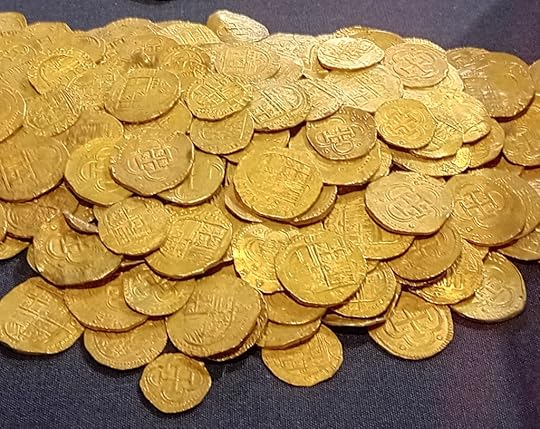The Rich Word History of Sumptuous
Hello,
This week’s word is one the Romans gave us and it doesn’t come cheap. I went looking for my photos from the Palace of Versailles as an example of something being sumptuous, but couldn’t find them. You’ll have to make do with a pile of gold coins from the Spanish Armada, on display at the Ulster Museum in Belfast. It’s enough to make a pirate greedy.

Something being sumptuous is because it’s seen as expensive or luxurious and it arrived in English in the late 1400s via sumptueux in Old French but it originated in sumptuosus (costly, lavish, wasteful) in Latin. This was thanks to the verb sumere (to borrow, spend, eat, consume, take). The verb was shortened from sub (under) and emere (to take or buy) so sumptuous has been linked to consumption from the very start.
It’s interesting to note that there’s an implication of excess consumption from the start too. Lavish sumptuous clothes, homes, etc will always be commented upon by those who don’t have the finances to match or keep up with that level.
One way the struggle was controlled over the years, and right across the globe, was via sumptuary laws, from the same linguistic roots. You’d find them, in various local forms, in China, Japan, ancient Greek and Rome, Britain through the centuries, Italy, and France. Naturally as laws were generally created by those at the top, these laws controlled the consumption at lower levels of society, rather than the other way around.
For example, only the elite could use the imperial purple dye for their clothes in ancient Rome. Which furs you adorned yourself with were controlled in Britain, and France liked to limit the use of gold in fashion to the nobility.
The idea was ostensibly to restrain extravagance and excessive spending on clothes, food, and furnishings but often the sumptuary laws existed to clarify and illustrate social rank and class. Nobility didn’t want rich merchants to enfringe on their way of life. The royal family didn’t want their nobles getting ideas above their station.
Until next time happy reading, writing, and wordfooling,
Grace (@Wordfoolery)
p.s. Want more Wordfoolery? Subscribe to the monthly newsletter “Wordfoolery Whispers”. Don’t forget to click on the confirmation email, which might hide in your spam folder.



